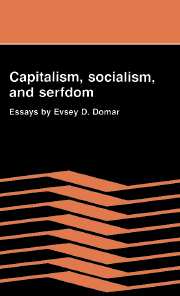Book contents
- Frontmatter
- Contents
- List of tables and figures
- Foreword
- Acknowledgments
- Part I Economic systems
- Part II Economic growth and productivity
- Part III Soviet economics
- Part IV Slavery and serfdom
- 12 The causes of slavery or serfdom: a hypothesis
- 13 On the profitability of Russian serfdom
- 14 Were Russian serfs overcharged for their land by the 1861 Emancipation? The history of one historical table
- Index
12 - The causes of slavery or serfdom: a hypothesis
Published online by Cambridge University Press: 05 March 2012
- Frontmatter
- Contents
- List of tables and figures
- Foreword
- Acknowledgments
- Part I Economic systems
- Part II Economic growth and productivity
- Part III Soviet economics
- Part IV Slavery and serfdom
- 12 The causes of slavery or serfdom: a hypothesis
- 13 On the profitability of Russian serfdom
- 14 Were Russian serfs overcharged for their land by the 1861 Emancipation? The history of one historical table
- Index
Summary
The purpose of this essay is to present, or more correctly, to revive, a hypothesis regarding the causes of agricultural serfdom or slavery (used here interchangeably). The hypothesis was suggested by Kliuchevskii's description of the Russian experience in the sixteenth and seventeenth centuries, but it aims at a wider applicability.
According to Kliuchevskii, from about the second half of the fifteenth century Russia was engaged in long and hard wars against her western and southern neighbors. The wars required large forces that the state found impossible to support from tax revenue alone. Hence the government began to assign lands (pomest'ia) to the servitors, who were expected to use peasant labor (directly and/or via payments in kind and/or money) for their maintenance and weapons. In exchange, the servitor gave the peasants a loan and permitted them, free men as yet, to work all or part of his land on their own. The system worked rather badly, however, because of shortage of labor. Severe competition among landowners developed, the servitors being bested by lay and clerical magnates. Things became particularly difficult for the servitors after the middle of the sixteenth century when the central areas of the state became depopulated because of peasant migration into the newly conquered areas in the east and southeast. Under the pressure of the serving class and for certain other reasons, the government gradually restricted the freedom of peasants, already hopelessly in debt to their landlords, to move.
- Type
- Chapter
- Information
- Capitalism, Socialism, and SerfdomEssays by Evsey D. Domar, pp. 225 - 238Publisher: Cambridge University PressPrint publication year: 1989
- 13
- Cited by

